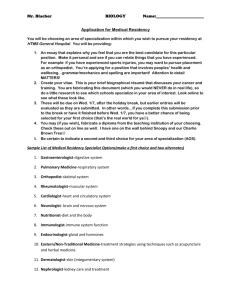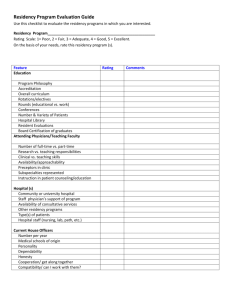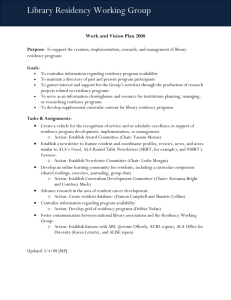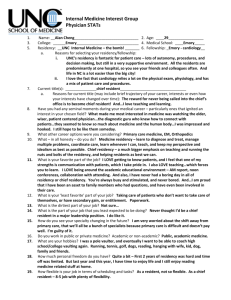311 - American Medical Association
advertisement
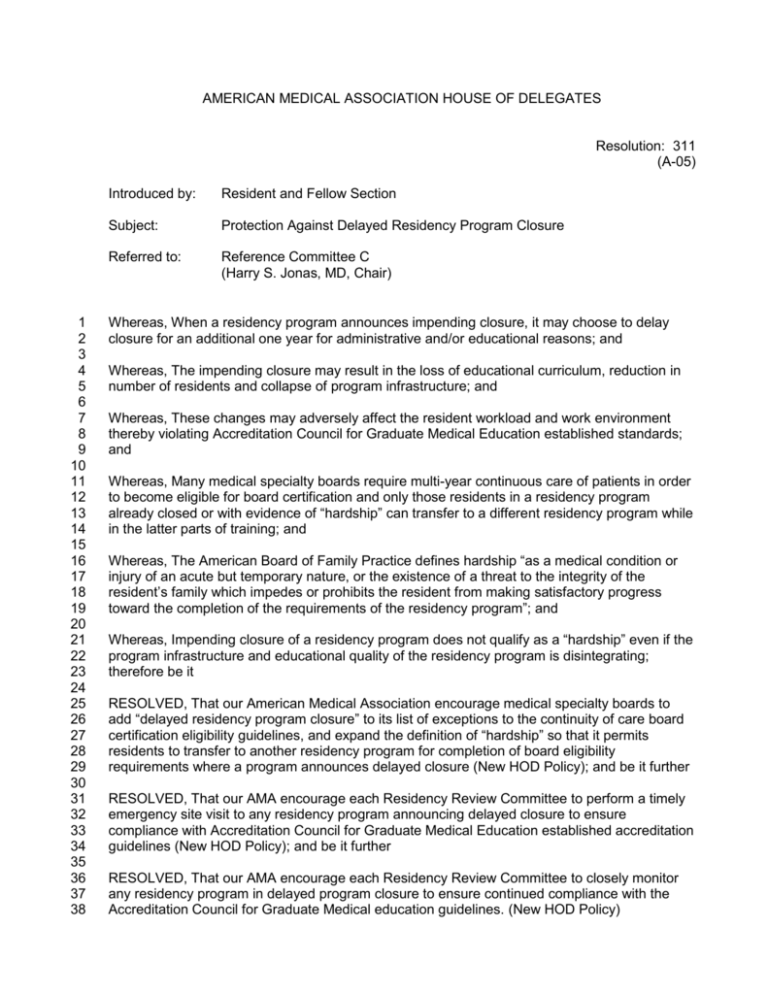
AMERICAN MEDICAL ASSOCIATION HOUSE OF DELEGATES Resolution: 311 (A-05) 1 2 3 4 5 6 7 8 9 10 11 12 13 14 15 16 17 18 19 20 21 22 23 24 25 26 27 28 29 30 31 32 33 34 35 36 37 38 Introduced by: Resident and Fellow Section Subject: Protection Against Delayed Residency Program Closure Referred to: Reference Committee C (Harry S. Jonas, MD, Chair) Whereas, When a residency program announces impending closure, it may choose to delay closure for an additional one year for administrative and/or educational reasons; and Whereas, The impending closure may result in the loss of educational curriculum, reduction in number of residents and collapse of program infrastructure; and Whereas, These changes may adversely affect the resident workload and work environment thereby violating Accreditation Council for Graduate Medical Education established standards; and Whereas, Many medical specialty boards require multi-year continuous care of patients in order to become eligible for board certification and only those residents in a residency program already closed or with evidence of “hardship” can transfer to a different residency program while in the latter parts of training; and Whereas, The American Board of Family Practice defines hardship “as a medical condition or injury of an acute but temporary nature, or the existence of a threat to the integrity of the resident’s family which impedes or prohibits the resident from making satisfactory progress toward the completion of the requirements of the residency program”; and Whereas, Impending closure of a residency program does not qualify as a “hardship” even if the program infrastructure and educational quality of the residency program is disintegrating; therefore be it RESOLVED, That our American Medical Association encourage medical specialty boards to add “delayed residency program closure” to its list of exceptions to the continuity of care board certification eligibility guidelines, and expand the definition of “hardship” so that it permits residents to transfer to another residency program for completion of board eligibility requirements where a program announces delayed closure (New HOD Policy); and be it further RESOLVED, That our AMA encourage each Residency Review Committee to perform a timely emergency site visit to any residency program announcing delayed closure to ensure compliance with Accreditation Council for Graduate Medical Education established accreditation guidelines (New HOD Policy); and be it further RESOLVED, That our AMA encourage each Residency Review Committee to closely monitor any residency program in delayed program closure to ensure continued compliance with the Accreditation Council for Graduate Medical education guidelines. (New HOD Policy) Resolution: 311 (A-05) Page 2 Fiscal Note: Staff cost estimated at less than $500 to implement. Received: 5/11/05 RELEVANT AMA POLICY H-310.943 Closing of Residency Programs The AMA: (1) encourages the Accreditation Council for Graduate Medical Education (ACGME) to address the problem of non-educational closing or downsizing of residency training programs; (2) encourages the ACGME to develop guidelines for the institution to follow in such closings or reductions that provide for adequate notification and out-placement service (such as resource contacts, transfer assistance, and financial assistance); (3) reminds all institutions involved in educating residents of their contractual responsibilities to the resident; (4) encourages the ACGME and the various Residency Review Committees to reexamine requirements for "years of continuous training" to determine the need for implementing waivers to accommodate residents affected by non-educational closure or downsizing; (5) urges residency programs and teaching hospitals be monitored by the applicable Residency Review Committees to ensure that decreases in resident numbers do not place undo stress on remaining residents by affecting work hours or working conditions, as specified in Residency Review Committee requirements; and (6) urges institutions that initiate significant reductions in graduate medical education programs (in excess of 20 percent of the trainee complement or in excess of 10 percent of trainees for a given year), or that voluntarily close programs, be requested prior to or at the time of the reduction to file a concise summary of its educational impact with the Accreditation Council for Graduate Medical Education or the relevant Residency Review Committees. (Sub. Res. 328, A-94; Appended by CME Rep. 11, A-98)

